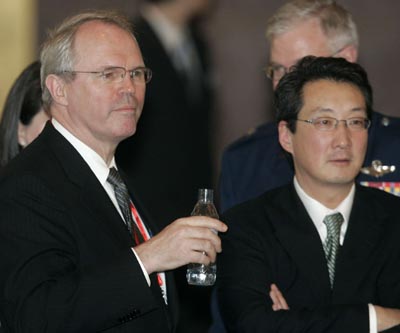North Korea talks resume on positive note
(AP/Xinhua)Updated: 2007-02-09 11:18
|
|
Talks on North Korea's nuclear programs resumed on a positive note Thursday, with the Chinese hosts distributing a draft agreement and the North agreeing in principle to initial steps to disarm.
Envoys from six nations are trying to agree on steps to implement a September 2005 deal in which North Korea pledged to disarm in exchange for aid and security guarantees. The 2005 deal ¡ª the only one to emerge since negotiations began in 2003 ¡ª was a broad statement of principles that did not outline any concrete steps for dismantling North Korea's nuclear program.
"The Chinese delegation circulated a draft, but we haven't had much discussion yet....it's a process starting with discussion and moving to the written form," said the main U.S. envoy, Assistant Secretary of State Christopher Hill.
"Surely we will have bilateral meetings with all other parties discussing the draft. It will be a long day," said Hill.
Hill also indicated that the talks would establish "four to six" working
groups to deal with the denuclearizatioin process.
Hill said the new proposal would be "a set of actions that would have to be taken in a finite amount of time." He declined to give specifics, but said moves would occur in a matter of weeks.
"The delegations are coalescing around some of the themes that we believe should be the basis for a first step in implementing" the 2005 agreement, Hill said. "The first step of a journey is often the most difficult step, and this effort is in fact proving that."
A South Korean official, speaking early Friday on condition of anonymity because of the ongoing diplomacy, said China circulated a draft proposal. The official gave no details, but other delegates said earlier that the agreement would outline initial steps for implementing the 2005 accord.
Such an agreement would set the stage for the first tangible steps in more than three years of negotiations.
Reports said the draft agreement proposed stopping within two months the work of DPRK nuclear sites, including the Yongbyon reactor, and supplying Pyongyang with alternative energy sources.
On Friday, South Korea's envoy at the Beijing talks, Chun Yung-woo, told reporters that the draft agreement offered a good start for discussions.
"It's good as a basis for negotiations, but I don't want to predict whether there will be smooth negotiations," he said as he left his hotel en route to a second day of talks. He declined to give any details of what the draft contained.
Chun said the draft is more specific than the broad 2005 joint statement, but warned it's still hard to say whether the talks will go ahead successfully.
US Secretary of State Condoleezza Rice said in Washington she was "cautiously optimistic" that the implementation of the agreement could begin.
At the last round of talks in December, in the wake of
North Korea's Oct. 9 underground nuclear test, the North refused even to talk
about its nuclear programs. Instead, Pyongyang demanded the U.S. lift financial
restrictions targeting alleged North Korean counterfeiting and money laundering.
| 1 | 2 |  |
|
||
|
||
|
|



